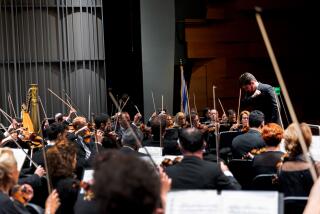Choral Spotlight Falls on the Long-Neglected ‘Jewish Bach’ : Music: After decades of neglect, the works of Odessa choirmaster David Nowakowsky are finally getting a hearing, thanks to his grandson.
- Share via
The surviving manuscripts of the Russian-Jewish composer David Nowakowsky were rescued from the chaos following the Bolshevik revolution, smuggled from Germany on the eve of Kristallnacht, safely stashed during World War II--and then forgotten in the ensuing peace.
Nowakowsky (1848-1921), who some called the “Jewish Bach,” was choirmaster of the Brody Synagogue in Odessa for 52 years, writing more than 15,000 pieces of classical and liturgical music. Today only about 3,500 works are known to exist and just 130 have been published.
Roger Wagner will conduct a dozen of those pieces tonight at UCLA in the first concert of Nowakowsky’s music to be presented in a secular setting. The concert takes place at 8 p.m. in Royce Hall.
Nowakowsky’s grandson, David Novack, 72, of Los Angeles, has devoted the last decade to reviving the composers work.
“This music is a duty, a responsibility,” Novack said. “It was worth risking one’s life for because it is priceless. You cannot put a dollar value on it.”
Nowakowsky died in poverty in 1921 and his daughter Rosa fled Odessa to Germany in the early 1920s, taking with her many of the composer’s manuscripts. In 1938, Rosa’s daughter Sophia gathered the manuscripts again--this time to flee the Nazis.
In 1940, the Nazi Institute for Research into the Jewish Question published a book titled “Lexicon of Jews in Music.” The book listed Nowakowsky and hundreds of other Jewish composers whose music was not to be played and musicians who were not to be hired.
The Nazis marched into Holland and Belgium and in 1940, Sophia and her family escaped to the south of France near the Swiss border. In Collonges-sous-Saleve, a sympathetic abbot offered them refuge and found a spot to hide the music.
Last summer, Novack returned to France and to the farmhouse in Archamps where the manuscripts were safe-housed from 1942-45. There, in a hole dug in the cellar floor under the manure heap, the music survived the war in two sturdy German ammunition boxes.
“It was almost, I’d call it, a Jobian burden,” Novack said of the manuscripts.
“They carried this music at the risk of their own lives. Then it was almost as if it was forgotten in the attempts to get back to their normal lives in war-torn Europe.” The family retrieved the manuscripts and began a peaceful life in Sceaux, but the music remained boxed--safe but unheard.
The bulk of the surviving manuscripts came to New York when Sophia’s son, Alexander, came to study at Columbia University in the 1960s. In the Park Avenue Synagogue, he found a final caretaker for his great-grandfather’s music. Still, most of the music remained unplayed.
Roger Wagner had never heard of Nowakowsky before being approached to conduct the Royce Hall concert.
“This is an especially challenging concert for me because everything is new.” While Wagner does not compare Nowakowsky to Bach, he said the composer is important in the realm of liturgical Jewish music, calling some pieces “outstanding.”
A limited number of Nowakowsky’s works have been heard in scattered locations, but Novack hopes to introduce Nowakowsky to the next generation of classical and liturgical music lovers. One goal of the David Nowakowsky Foundation is to raise money to have the manuscripts published--and eventually recorded on compact disc.
Novack recognizes his family’s dedication in preserving Nowakowsky’s music, but said, “If we didn’t feel the music was beautiful, I don’t think we could do it. It has to be more than just responsibility. The music itself has to drive you--it does drive you.”
More to Read
The biggest entertainment stories
Get our big stories about Hollywood, film, television, music, arts, culture and more right in your inbox as soon as they publish.
You may occasionally receive promotional content from the Los Angeles Times.










